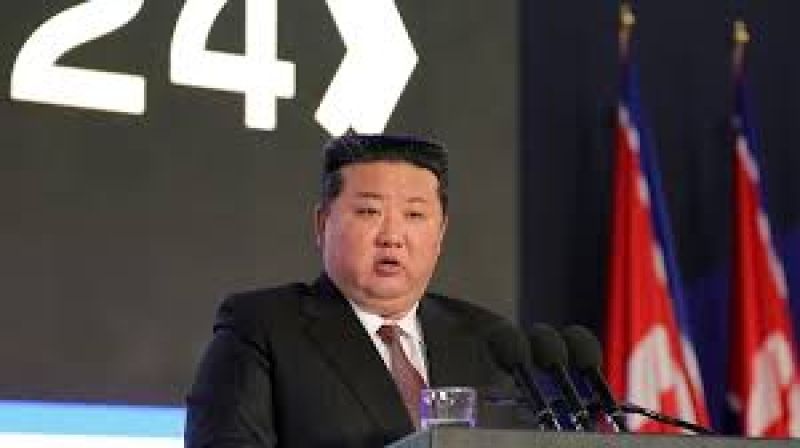- CA Yunus pays homage to Liberation War martyrs on Victory Day |
- Bangladesh capital market extends losing streak for second day |
- Bangladesh celebrates Victory Day Tuesday |
- 'Different govts presented history based on their own ideologies': JU VC |
Past U.S. Diplomacy Confirms Washington’s Hostility: Kim

North Korean leader Kim Jong Un
North Korean leader Kim Jong Un stated that his previous negotiations with the United States only reinforced the belief that Washington's hostility toward Pyongyang remains unwavering. He also emphasized that North Korea's nuclear buildup is the sole effective strategy to counter external threats, according to state media reports on Friday.
Kim made these remarks on Thursday during a defense exhibition, where North Korea showcased some of its most advanced weapons, including intercontinental ballistic missiles (ICBMs) capable of targeting the U.S. mainland. The exhibition follows Kim's recent vow to relentlessly expand North Korea’s military nuclear program in a meeting with military officers last week.
While Kim has not commented directly on the prospect of Donald Trump's reelection as U.S. president, his first term saw three high-profile summits between the two leaders in 2018 and 2019. However, these talks eventually collapsed due to disagreements over the sequencing of the lifting of U.S.-led economic sanctions and North Korea's nuclear disarmament.
During his speech at the exhibition, Kim did not name Trump, but alluded to the failure of those diplomatic efforts: “We have already gone as far as possible with the United States in negotiations, and what we confirmed was not a superpower’s will for coexistence, but a hardline stance grounded in force and a hostile, unchanging policy toward North Korea.”
Kim accused the U.S. of escalating military pressure by enhancing cooperation with regional allies and increasing the deployment of "strategic strike means"—likely referring to the stationing of long-range bombers, nuclear-capable submarines, and aircraft carriers. He called for an accelerated buildup of North Korea's nuclear-armed military, claiming that only a “strongest defense power that can overwhelm the enemy” guarantees the country's security.
Kim's expanding arsenal includes missiles designed to strike South Korea, Japan, and long-range systems with the potential to reach the U.S. mainland. Analysts suggest that Kim's nuclear ambitions are geared towards pressuring Washington to recognize North Korea as a nuclear power, thereby negotiating from a position of strength to secure economic and security concessions.
In recent months, Kim’s foreign policy focus has shifted toward Russia, as he seeks to strengthen his global position amid growing tensions with the West. He has aligned himself with President Vladimir Putin's broader geopolitical stance, embracing the concept of a “new Cold War.” In exchange for providing Russia with extensive military aid, including artillery systems and missiles, North Korea stands to gain economic assistance and potentially advanced technology to bolster its nuclear and missile capabilities, according to international experts.
Despite the possibility of Trump returning to the White House, experts suggest that a swift resumption of diplomacy with Pyongyang remains unlikely. North Korea's growing alliance with Russia, coupled with diminishing sanctions enforcement, presents significant obstacles to diplomatic efforts aimed at resolving the nuclear standoff. Furthermore, Kim’s recent arsenal expansion may bolster his perception of bargaining power, making it harder for the U.S. to extract meaningful concessions without addressing North Korea’s nuclear ambitions.

